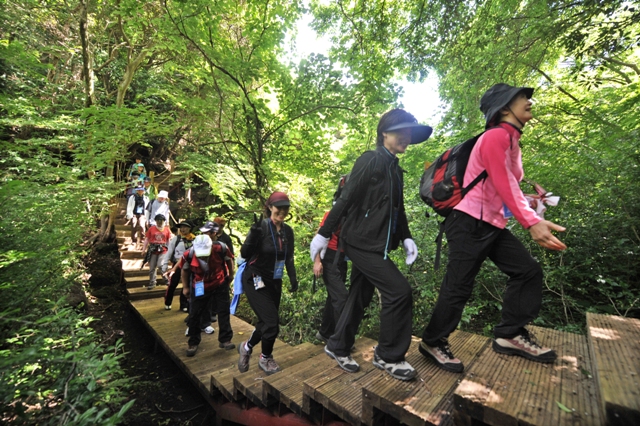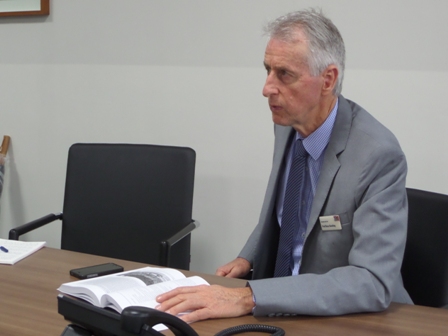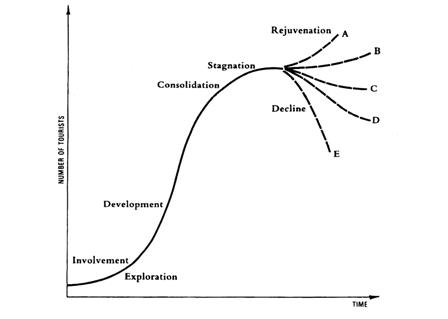| |
 |
|
| ▲ Sustainable tourism with increased spend-per-tourist is key, says Dowling. Photo courtesy Jeju Tourism Organization |
In conversation with The Jeju Weekly, Dr. Ross Dowling, professor of tourism at Australia’s Edith Cowan University, said that local tourism strategy must take into account threats to the industry’s sustainability.
Dowling, who is also a high-ranking advisor to UNESCO and the Global Geopark Network, says Jeju needs to re-focus back to the ABCs of sustainable tourism – abiotic, biotic, and cultural tourism.
“Sustainability is the engine that drives all of tourism, regardless of size. Geo (abiotic), eco (biotic), and cultural tourism are all forms of tourism, all driven and underpinned by a sustainable approach,” says Dowling.
The professor, who was on the island to deliver a lecture to students at international school NLCS Jeju, says that despite such models being present on Jeju, government strategy seems to prioritize increasing domestic and international footfall.
An outdated model
| |
 |
|
| ▲ Professor Ross Dowling wants to see a shift in Jeju's tourism model. Photo by Plamen Mavrov |
Visitor numbers have shown extraordinary growth in the last 10 years. Up from 5 million tourists in 2005, there were 12 million tourists in 2014, and the province’s target of 20 million by 2020 is well within reach.
This growth, however, actually represents a threat to Jeju tourism as “reckless development” increasingly ires locals and makes it harder to glimpse the Jeju of even a few years ago.
In forsaking long-term sustainability for short-term profits and mass tourism, the island could diminish the values which brought its cherished UNESCO Triple Crown of Biosphere Reserve, World Natural Heritage, and Global Geopark statuses.
These are very sustainable titles, yet behind the facade Dowling fears that the top-down strategy reflects an outdated mass tourism model targeting mere quantitative growth as the lucrative Chinese boom continues.
“That is old-school thinking. That is last century’s thinking,” Dowling says bluntly.
The island’s infrastructure struggles to keep pace with the increasing influx by air and sea, and low-cost carriers and large cruise ships also bring pollution with their thousands of visitors, even with advances in aircraft and cruise ship technologies.
The expanding fleet of luxury coaches to ferry these tourists around also threaten Jeju’s carbon-free 2030 goal, by which time all vehicles must be electric.
While this is a wider structural problem of global tourism, says Dowling, individual destinations can still lead the way.
“In its present form travel is unsustainable globally. But there is no reason why countries, once you hit the ground in a place such as Jeju, can’t begin to develop a more sustainable form of tourism,” says Dowling.
The roadmap to sustainability
The fundamental principles of sustainable development, says Dowling, are environmental friendliness, connectivity with, and economic benefaction to, the local community.
Given these principles, the locals clearly emerge as the central point around which tourism must develop if it is to be self-sustaining and environmentally friendly.
The road to sustainability for Jeju, then, is to relax its obsession with inbound tourist numbers and focus more on what people leave behind after they board their homebound flights.
Therefore, profit per person must be the government’s statistical focus, and policy must combat the danger of multinational corporations repatriating profits, says Dowling.
“We don’t want people, mainly from China, to be coming here and leaving behind only a little money in shops, restaurants, and the odd attraction. They [the government] have to put money back into conservation and communities – that’s the measure. That’s the key. In time, the choice becomes clear.”
At a fork in the road
| |
 |
|
| ▲ Butler tourism lifecycle. |
According to the Butler lifecycle, a curve graph measuring tourism development, Jeju stands between the development and consolidation stages. If correct, it suggests there is room ahead for growth before stagnation and decline.
Jeju can either continue to focus on an unstable source of profit, and neglect conservation principles associated with its UNESCO status, or it can begin to develop laterally along a sustainable model.
Success would thus be measured not in numbers, but in tangible benefits to the environment and local community.
Dowling adds that Bhutan’s entry cap and tourist spending quota, or northern Australia’s Aboriginal cap on cruise tourism, do not provide ideal models for Jeju; the local government needs to find its own course over time.
“What I would suggest to the Jeju government is that they do not give up mass tourism — you can’t just turn that switch off — but that they begin to also develop, in parallel, sustainable tourism. It may take them a while to realize that sustainable tourism is fewer tourists but better returns.”
If the Butler lifecycle proves correct, 2020 — and the government’s 20 million target — may be as good as it gets on the current model, with saturation and decline ahead. When asked if Jeju could avoid this fate, Dowling is optimistic.
“Absolutely, you can turn this back at any time. A natural equilibrium can be reached.”
Only time will tell if Jeju can find its equilibrium and finally settle down, bringing back the peace and calm that had for so long permeated the land. |






















